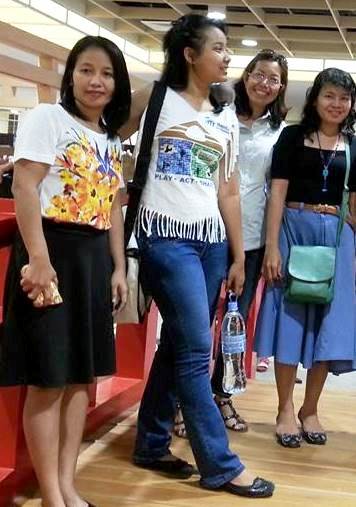What’s Up Phnom Penh Magazine
An article by Ismail Vorajee
Kounila Keo on blogging, the power of technology, and the controversial new cyber crime bill

The 26-year old journalist and blogger extraordinaire Kounila Keo describes herself in simple terms, yet for those who have had the pleasure of reading her work know there is something very special about Miss Keo.
Fire up your laptop and hammer in the phrase ‘Cambodia Blog’ into your search bar, and who sits at the very top of the results churned out by Google? It’s Cambodia’s very own resident blogger, Kounila Keo. Her addictive ‘Blue Lady Blog’ is a magnet for thousands of individuals both inside and outside Cambodia, and was the very first I encountered when researching my latest country of residence.
Her talents however are not limited to merely the written word. When she isn’t writing stories for Agence France-Presse or other international news organisations, she can be found on stage at TED events delivering engaging motivational speeches, organising highly innovative community events and inspiring the next generation. We caught up with Kounila to hear her thoughts and seek her valuable insight into all things Cambodia and technology.
Can you give us an introduction about yourself, how you got into blogging, and what you are working on at the moment?
I got into blogging when I was a journalism freshman at the Royal University of Phnom Penh. I got hooked into writing just about anything I could think of, things that made me sad or happy. Currently, I’m working as Communications Specialist for a 3-year tech project that works to increase the uptake of technology and innovations in Cambodia. I’m loving it because I’m working on technology and innovations to encourage more startups, and working with civil servants to do their jobs better using technology.
Your writing and blogging has fans throughout Cambodia and the world. Did you ever think it would get so big when you started?
No, I never thought that it would be picked up by the media or read by a lot of people like that. I wrote for myself, and I still do. I still enjoy going back to old posts and reading them just to find out how much I’ve grown up.
What advice do you have for Cambodia’s youth in harnessing the power of technology? Why is it important?
I think technology is very important. It has changed my life for the better and improved my studies as well as my critical thinking. I believe that technology is nothing without reading to find out about other areas of knowledge such as politics, economics, and society and embracing them gradually and smartly.
All young people everywhere should try to have access to technology to empower themselves. They should also learn to understand the positive and the negative consequences of misuse of technology. After all, technology is only there to improve the quality of human lives. What I see missing in this technological-era is the understanding that nothing is as powerful as human interactions.
How important is it for women to be technologically literate in today’s society?
I think it is as important for women as well as men to be technologically literate because technological literacy prepares individuals to make well-informed decisions as a consumer, student, professional and more. For a lot of young people, technology literacy is essential for a successful studies or job searches.
Technology can help us or mess us up if not used properly. We all should ask ourselves why we should care about it or how it can help us do our work better. After all, technology literacy helps foster higher thinking, problem solving skills, as well as digital citizenship that will serve and benefit individuals.
What are your thoughts on the draft cyber- crime bill currently being debated?
The cyber-crime bill has raised a lot of concerns because it proposes criminalizing content that is deemed to hinder sovereignty and integrity of Cambodia. The ambiguity of provisions could create a chilling effect for freedom of expression and speech in Cambodia, if the current draft we saw was passed. A lot of people I talked to said they are not against the bill/draft; however, some of the content in the current draft should not be part of the cyber-crime law because technically, cyber-crime law seeks to deal with a wide range of criminal offences committed on computers or online through similar electric devices. It seeks to protect people from hacking, piracy, cyber terrorism and other offences, and it should not be made into a law that would stop people from expressing themselves online and offline. It helps when Cambodians start discussing and debating offline and online, which will enhance society. That will make Cambodians intellectually and commercially competitive with neighbouring countries in the long run.
Finally, what can we expect from you in the future? Anything on the horizon which we should know about?
I will continue making community events in Cambodia. I’ve organized events like Filmcamp, Blog Festival, FOSSASIA, and a few others. I will help organize regional events as well. But, I think people like surprises.